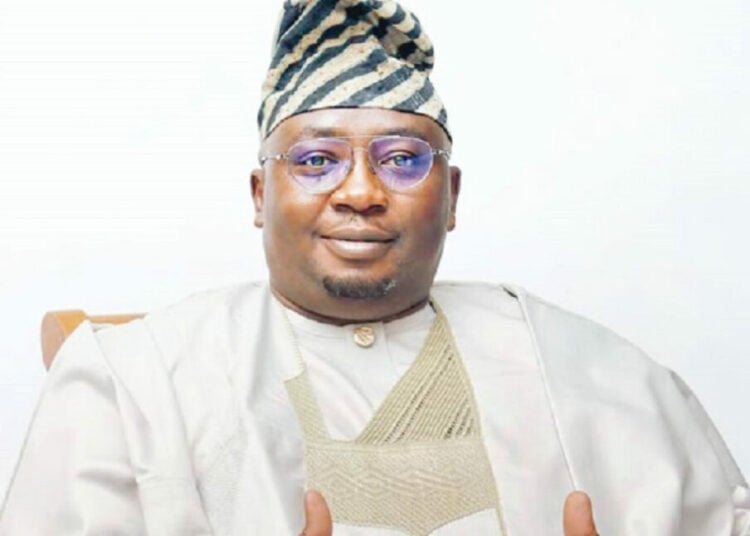The federal government plans to impose a minimum capital requirement on electricity distribution companies (DisCos) as part of their licence renewal conditions, aiming to strengthen the utilities’ financial health and liquidity.
The Minister of Power, Adebayo Adelabu, made this known during the Nigeria Energy Forum (NEF) 2025 in Lagos, on Tuesday.
Speaking at the forum themed, “Powering Nigeria through Investment, Innovation, and Partnership”, Adelabu, who was silent on the amount, stated that the government was working to address the capitalisation challenges that have burdened many with debt.
Adelabu noted that under-capitalisation and a heavy debt burden continued to hamper several Distribution Companies (DisCos), constraining their operational efficiency and service delivery. He sttated that the Nigerian Electricity Regulatory Commission (NERC) and state regulatory bodies were collaborating to boost performance across the sector.
Nigerian Power Discos face liquidity issues due to inadequate grid supply, ageing infrastructure, underqualified staff, low metering, inaccurate customer data, lack of investment due to poor revenue, insufficient tariffs, and substantial ATC&C losses.
DisCos’ limited operational funds hinder infrastructure investment, network maintenance, and payments to GenCos, degrading the quality and reliability of consumers’ electricity supply, leading to persistent billing and collection loses, which compounds the federal government’s subsidy obligations.
The liquidity shortfall has compounded the sector’s debt woes as generation companies (GenCos) recovered only 28 per cent of their outstanding debts in 2024
The country’s electricity subsidy bill has ballooned to N1.05 trillion in the first half of 2025, nearly wiping out the N1.12 trillion total revenue generated by the nation’s 11 electricity distribution companies (DisCos) in the same period.
Liquidity constraints remained acute. For every N100 billed, about N25 is lost to poor remittance, consumer dissatisfaction, and electricity theft. Industrial giants such as Ajaokuta Steel reportedly made no remittance for power consumed in the second quarter of the year.
In July 2025 alone, DisCos recorded a revenue shortfall of N49.18 billion, despite marginal gains in billing and collection efficiency, according to data from the Nigerian Electricity Regulatory Commission (NERC). The gap was driven by the difference between the allowed average tariff of N116.25/kWh and the actual average collection of N89.30/kWh — a recovery efficiency of just 76.82 per cent.
Metering of electricity customers, which is the obligations of the DisCos, while improving slightly, with the national rate rising to 54.3 per cent after 412,792 new installations in the first half of the year. still, about half of Nigeria’s 11.8 million registered electricity consumers remain unmetered, perpetuating estimated billing and widespread discontent.
In response to deep-seated inefficiencies, the federal government has rolled out several reform initiatives. Chief among them are the National Integrated Electricity Policy (NIEP) and the Nigeria Integrated Resource Plan (NIRP), both targeting a cumulative $122 billion investment by 2045, including $29 billion projected over the next 20 years.
Other major interventions include Mission 300 — a $32.8 billion programme supported by the World Bank, African Development Bank (AfDB), and private investors — and ongoing talks with China’s Exim Bank for a $2 billion “super grid” loan facility.
More than $2 billion in financing has already been mobilised through various platforms: the $750 million World Bank DARES initiative for off-grid projects, the $500 million NSIA RIPLE fund for renewable energy investment, and a $190 million JICA facility for power infrastructure support.
To combat under-capitalisation, the government will introduce a minimum capital adequacy requirement for utilities as part of the license renewal process. This measure aims to strengthen their financial health and liquidity.
“This is why we are going to focus on the DisCos this year and carry out a lot of restructuring, a lot of reforms in the DisCos. They are not ready to make more investments. And the balance sheet is not healthy enough to even attract debts from the finance sector,” the power minister said earlier.
Industry voices at the event amplified calls for stronger initial capital as the managing director of Azura Power, Engr. Edu Okeke urged that each DisCo should have a minimum shareholder capital base of $500 million to operate effectively within the distribution value chain, stating that most DisCos are currently negative on balance sheets.
Okeke, who spoke during a panel session at the 10th Anniversary celebration of the Association of Power Generation Companies (APGC) on Tuesday in Abuja, said, “You can’t operate any of the DisCos in Nigeria with less than $500 million shareholders’ fund; unfortunately, all of them are basically negative.”
“What the government should first do is clean up the balance sheets of DisCos,” he added. He emphasised that the government’s first task should be to clean up these balance sheets.”
Since assuming office in 2023, the power minister has implemented a comprehensive, multi-pronged reform agenda to reposition the Nigerian power sector for sustainability, efficiency, and growth. This agenda addresses structural challenges, unlocks private capital, and enhances service delivery across the electricity value chain through legislation, policy reforms, infrastructure development, energy transition and access expansion, and local content and capacity development.
The Minister cited the Electricity Act 2023, which has already enabled regulatory autonomy for 15 states, as a key achievement. He also announced the approval of the Integrated National Electricity Policy, the first comprehensive, sector-wide policy in almost two decades.
“This signifies a move towards a liberalised, investment-friendly electricity market. Following its enactment, 15 states gained regulatory autonomy to create subnational electricity markets, with one already operational. We are collaborating with these states to align wholesale and retail markets effectively. State government involvement, especially in the off-grid sector, is crucial, evidenced by the REA’s roundtable discussions with governors and ongoing monitoring of DisCo performance within their jurisdictions”.
On stabilisation of the market and sector commercialisation, he said the government is deepening power sector commercialisation to strengthen revenue, liquidity, and investor confidence. “ Through tariff policy reforms which enabled cost-reflective tariffs for select consumers, supply reliability has improved while reducing energy costs for industries, and industry revenue has increased by 70 per cent to N1.7 Trillion in 2024 compared to the previous year, and the revenue is expected to exceed N2 Trillion for 2025”.
To stabilise the market, he announced, “Mr President has approved a N4 trillion bond to clear verified GenCo and gas supply debts. Alongside this, a targeted subsidy framework is being developed to protect vulnerable households and ensure a sustainable path toward full commercialisation and viable industry”.
Adelabu provided updates on critical infrastructure projects. He confirmed that contracts for the Presidential Power Initiative (PPI) Phase One have been signed to add 7,000MW of operational capacity to the grid.
He also revealed that generation capacity has been sustained at an average of approximately 5,300MW in 2024, up from 4,200MW in 2023.
“In parallel to the grid expansion, generation capacity is being expanded through the rehabilitation of existing NIPP plants to unlock about 345MW, alongside the successful integration of the 700MW Zungeru Hydropower Plant into the grid. Collectively, these interventions have helped sustain an average generation capacity of approximately 5,300MW in 2024, up from 4,200MW recorded in 2023”.
The Minister disclosed further that the government has operationalised the Presidential Metering Initiative, with ₦700 billion already secured to deploy 1.1 million meters by the end of 2025.
He also noted that the unbundling of the Transmission Company of Nigeria (TCN) into two organisations: the Nigerian Independent System Operator (NISO), which manages the operation of Nigeria’s electricity grid and coordinates the electricity market, and the Transmission Service Provider (TSP), which owns, maintains, and expands the physical transmission infrastructure marks a long-awaited and critical structural reform in the power sector.
The Minister made a direct appeal for investment, emphasising that Nigeria’s power sector remains open and ready for business more than ever before. He pointed to the over 10 GW of stranded generation capacity as a critical opportunity, assuring stakeholders that market fundamentals are improving, the policy environment is clear, and the national leadership is committed.
“As we commence today’s forum, let me once again emphasise to our investors, financiers, and innovators that Nigeria’s power sector remains open and ready for business more than ever before. We recognise that achieving the scale of investment required to transform the sector requires greater private sector participation across the entire value chain, particularly in the transmission segment. A useful reference is South Africa’s ambitious $25 billion transmission grid expansion initiative, which seeks private developers to deliver 14,000 kilometres of new power lines and connect over 59 GW of new capacity within the next 14 years. This is remarkable when compared to Nigeria’s Presidential Power Initiative (the Siemens project), valued at $2.3 billion.
“In Nigeria today, we have over 10 GW of stranded generation capacity. Energy that could power industries, create jobs, and even support electricity exports to our neighbouring countries through the regional power pool. We are therefore open to strategic partnerships to mobilise the necessary investments and unlock this potential. Our market fundamentals are improving, our policy environment is clear, and the national leadership is committed to creating the enabling conditions for long-term investment and innovation”.





